NewsBeat
Trump comes out swinging in fast start to presidency
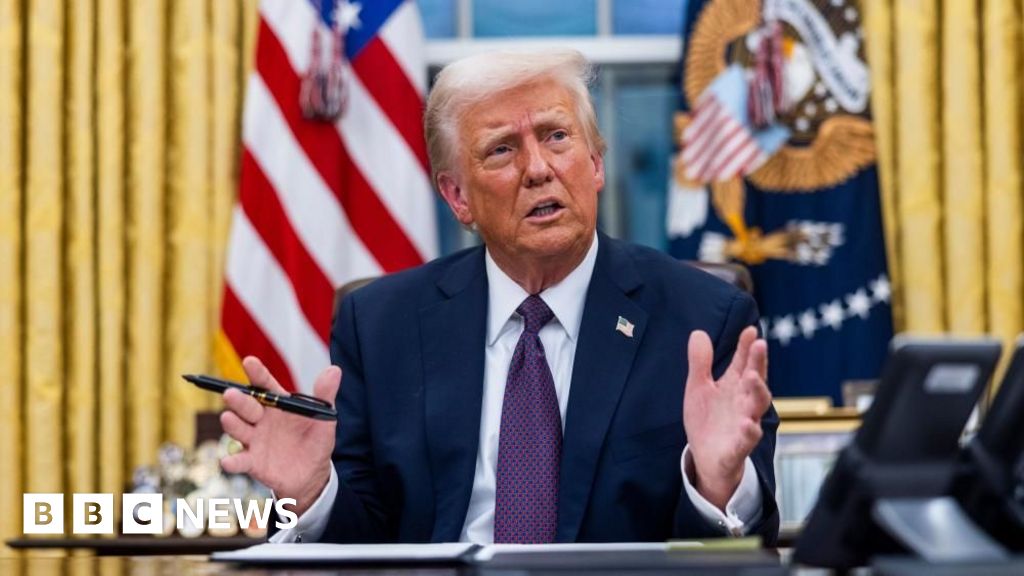
It’s been three days since President Donald Trump took office. And he has come out swinging.
On the 2024 campaign trail, he promised to bring rapid and sweeping change to American government and society if he were re-elected.
Some of his policies and reforms will take time – and congressional legislation – to enact. Other moves might be blocked by the courts.
In the first days of his presidency, however, Trump has already made waves with dozens of unilateral orders and actions that represent a substantial expansion of White House power.
For many of his supporters – so far – it looks like he has delivered on his promises.
“He signed all the executive orders that he told us he was going to do,” said 68-year-old Rick Frazier, a loyal Trump supporter from Ohio who has attended more than 80 of his rallies. “I’m satisfied with all that.”
That has been cause for concern among some. Mariann Budde, the Episcopal bishop of Washington, publicly asked Trump during a prayer service on Tuesday at the National Cathedral, to “have mercy upon people in our country who are scared now”.
Nowhere has this display of presidential authority been more prominent than on the topic of immigration, which polls suggest was a significant concern for many voters.
Just hours after taking office, Trump declared an emergency at the US-Mexico border, allowing him to deploy more US military personnel to the area.
He effectively closed the country to all new asylum-seekers and suspended already approved resettlement flights for refugees.
Mr Frazier’s daughter died of a heroin overdose last year. He told the BBC that the southern border was his top issue in the 2024 election.
“In my opinion had the border been closed, my daughter would not have had access to the compound that killed her,” he said.
Trump has also ordered authorities to stop granting automatic citizenship to the children of undocumented migrants born on American soil – setting up a lengthy legal battle over what had previously been viewed by courts as a constitutional guarantee.
One step that Trump repeatedly promised – but has yet to show signs of implementing – is mass deportations of migrants who crossed illegally into the US, something he said would start on day one of his presidency.
While some Trump officials have said the deportation process has begun, there have been no signs yet of the kind of law-enforcement raids or other expansive actions that would be necessary to detain and remove the millions of undocumented migrants who currently reside in the US.
Bryan Lanza, who previously served as a senior adviser to Trump, told the BBC’s Americast podcast that the total number of deportations is less important than the message it sends.
“It’s never about a number,” he said. “It’s more about the PR.”
If you deport a million undocumented migrants, he said, than the rest will start wondering if they’re next – and take steps to return to their home countries.
“Illegals aren’t welcomed here,” he said. “Every other country is allowed to say that. Why shouldn’t we?”
Immigration was a major issue that helped propel Trump to the White House, but in terms of voter concerns it was still dwarfed by worries about the economy and inflation.
So far the president has focused on energy policy – tying it directly to the high prices that millions of Americans have struggled with.
“When energy comes down, the prices of food and the prices of everything else come down,” Trump said on Tuesday evening. “Energy is the big baby.”
To that end, Trump declared a “national energy emergency” and rescinded Biden-era protections for fossil fuel extraction in Alaska and in American coastal waters. He also started the process of withdrawing the US from the Paris climate agreement, which commits nations to slashing emissions to try to avoid the most extreme effects of climate change.
Even optimistic estimates suggest these moves will take time to show any results, but Aziz Wehbey, a Syrian-American Republican voter in Allentown, Pennsylvania, said he was pleased by what he had seen so far.
“That’s a good sign for the economy, and for those of us who run businesses,” he said. “The economy is starting to move and not be frozen. Everyone will notice that.”
One topic that Trump has mentioned, but hasn’t acted on yet, is tariffs. He had pledged to slap them on some of America’s biggest trade partners on day one to protect American industries and generate new revenue to fund his favoured government programmes.
Economists, including some in the Trump administration, have cautioned that tariffs could drive up consumer costs and hurt American businesses that rely on imports in their supply chain. It could be a reason why Trump, with his eye on the stock market and economic growth, is treading more carefully when it comes to trade.
Many of President Trump’s other early executive actions focused on reshaping the vast federal workforce.
He has reinstated rules that allow him to fire senior-level civil servants, suspended new regulations and hiring, and ordered all federal employees involved in DEI – diversity, equity and inclusion – programmes to be put on paid leave.
He also renamed the Gulf of Mexico as the Gulf of America and instructed the US government to only recognise two sexes, male and female, in all official documents and forms. The changes, while controversial, have also been extremely popular with Trump’s base – a sign that the president will continue to lean in to contentious cultural issues.
Trump’s second term is just getting started. He promises more significant presidential actions in the days ahead – moves that will almost certainly test the limits of presidential power.
But the big splash, the noise, the drama, says former adviser Lanza, isn’t a problem for the president. It’s his strength.
“Where we are in modern politics today, which people haven’t figured out, is that from our standpoint, to communicate to voters are supportive of our issues, controversy enhances the message,” he said.
How do you get your message heard amid the overwhelming din of modern politics?
“It’s the controversy.”
Understand that, and the strategy behind Trump’s frenetic first days in office begins to come into focus.
With additional reporting from Bernd Debusmann Jr and Madeline Halpert
Politics
ABC The View ‘hypocrisy’ row explodes as panel defends Biden pardons while Trump’s branded ‘spineless’

The hosts of ABC’s The View have sparked outrage and claims of “hypocrisy” as they discussed the recent pardons issued by President Donald Trump and former President Joe Biden.
Tuesday’s episode of the US talk show was hosted by comedian Joy Behar, 82, lawyer Sunny Hostin, 56, journalist Sara Haines, 47, political strategist Alyssa Farah Griffin, 35 and TV personality Ana Navarro, 53.
The segment was prompted by President Trump’s move to pardon some 1,500 January 6 rioters as part of a flurry of executive orders signed immediately as he retook office.
Trump gave a “full pardon” to those jailed following the violent disorder in the last days of his first presidency, who he described as “hostages” of the previous administration.
As he signed the order, the president raised a complaint about former President Biden’s choice to issue blanket pre-emptive pardons for his family and members of the January 6 committee, including Dr Anthony Fauci and General Mark Milley, who had been investigating Trump.
“I was surprised that President Biden would go and pardon his whole family because that makes him look very guilty… and how about this J6 committee, why is he pardoning them? They were guilty as hell, they rigged it. It was a rigged deal,” he said to journalists.

Trump pardoned 1500 January 6 rioters amid a flurry of executive orders
Getty
“So, in Trump’s world the lawmakers trying to save democracy are ‘thugs’ and the lawbreakers are ‘hostages,” Behar said incredulously as she opened the floor to debate.
Also picking up on Trump’s use of the term hostages, Haines called the move “the biggest middle finger he could give the entire country out of all of his options.”
Alyssa Farah Griffin, who had worked as a communications director in Trump’s previous administration, slammed his pardons as “dangerous and reckless.”
While she praised Biden’s pardoning of Fauci and Milley, Griffin attempted to provide balance as she criticised Biden’s decision to extend the immunity to his family, saying his choices “floored her”.

Behar and her panel pulled no punches in criticising Trump
ABC
She explained it set a “dangerous precedent” for futurepresidents to abuse, adding: “I think it was disgraceful, and it’ll harm his legacy.”
The comment set the studio alight, with a volcanic Navarro furiously hitting back and defending the Democrat by arguing: “I think comparing Biden’s pardons to Trump’s is like comparing apples to Volkswagens.”
The audience clapped and cheered as she blasted Republicans who were not objecting to Trump’s pardons as having “absolutely no spine.”
“Nobody who stood up and condemned that and is today silent after those pardons should be able to look at themselves in the mirror because you have no morals,” she slammed.
Defending Biden, she added: “Joe Biden’s family and the people he pardoned have not actually committed any crimes. He is trying to prevent them spending the rest of their lives fighting the government.”
While not part of the most recent moves, the former president did issue an unconditional pardon to his son Hunter, who had pleaded guilty to tax charges in September 2023 – despite previously pledging not to.
Nevertheless, Hostin agreed, stating that she “was not offended by Biden pardoning his family.”
“We’ve already had a Trump presidency, we know this administration will be a vengeful one, we know this is a vengeful man.
“If I could protect me and mine, I would do that. SoI think we need to Joe Biden some grace,” she declared.
On Trump’s pardons, she said furiously: “He ran on this, ‘I’m going to be a law-and-order president,’ which a lot of the Republican Party runs on, so I think it’s really disgraceful that he would do that.”
LATEST DEVELOPMENTS:

The View panel were slammed as ‘”hypocrites” online for their comments
ABC
The debate sparked a huge response online, with some branding The View panel as “hypocrites” and “disgusting” after the majority defended Biden’s pardons while dismantling Trump’s.
“And here we have it: these women praise Biden for pardoning his family… and in return, condemn Trump for doing the same f*****g thing by pardoning the January 6th rioters. These women are f*****g insane. #TheView,” one slammed.
Another raged: “The same day Biden pardoned his entire family and the j6 committee. Something he said he wouldn’t do. Actually STFU,”
“This show is a boatload full of angry, disgruntled, downright mean women who hate love,” a third wrote disparagingly.
“This is absolutely DISGUSTING!!!” a fourth wrote in response to the clip while another simply raged: “Such hypocrisy.” (sic)
NewsBeat
Sneaky Britain? How our moral compasses are changing
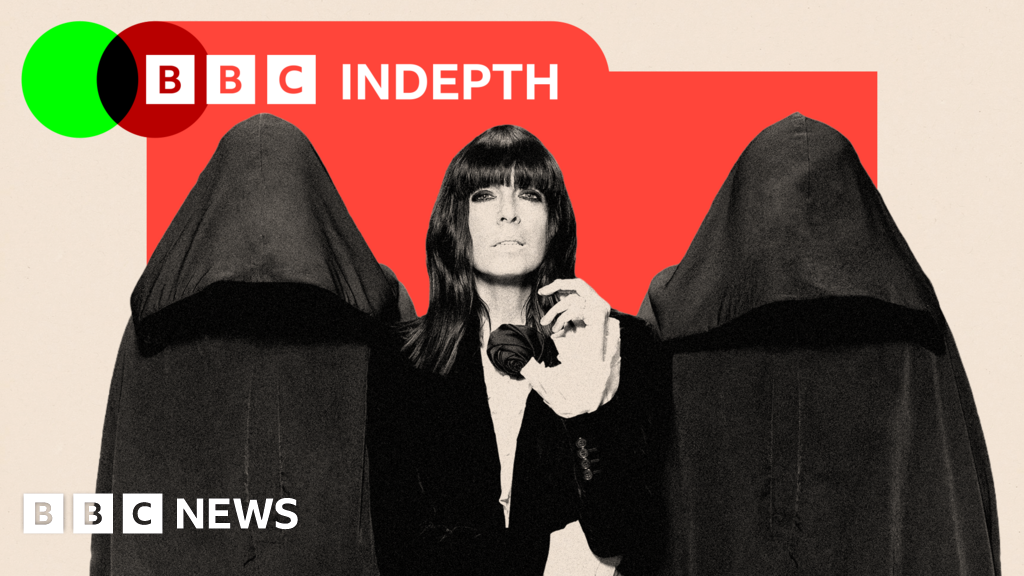
Could the popularity of The Traitors link to something wider going on among Britons – and our shifting attitudes towards dishonesty?
Politics
Watch as Patrick Christys launches blistering attack on Keir Starmer’s ‘appalling’ press conference
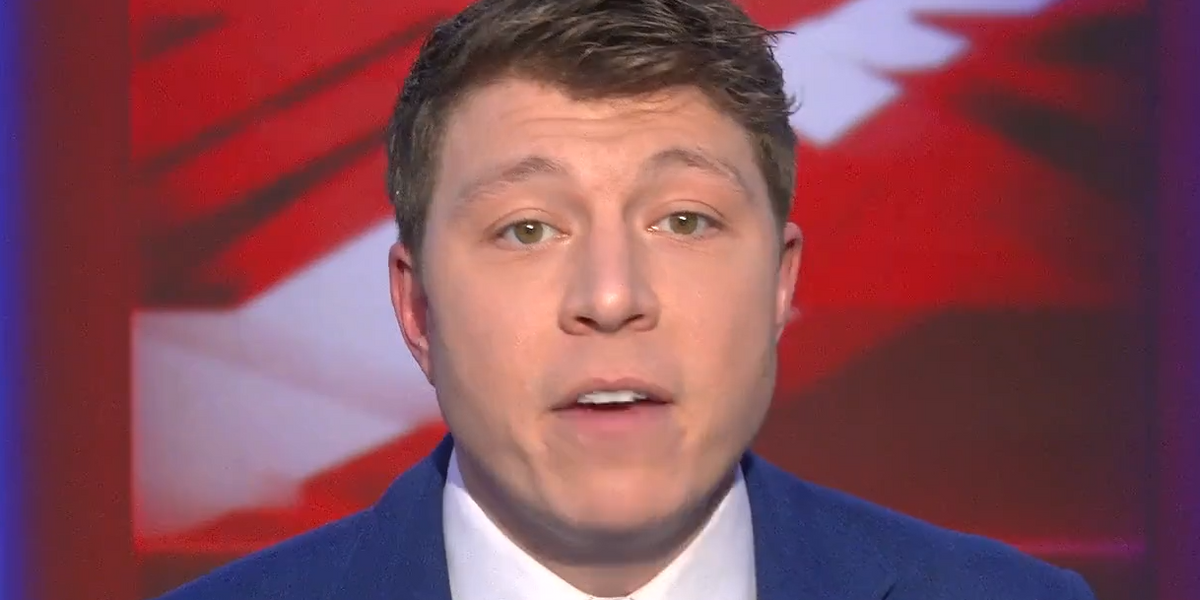

GB News presenter Patrick Christys has launched a scathing attack on Prime Minister Sir Keir Starmer’s handling of the Southport atrocity.
Speaking on GB News, Patrick called Starmer’s recent press conference “appalling” over his initial response to the incident.
He highlighted that Starmer knew about Axel Rudakubana’s jihadi terror manual and biological weapon whilst suggesting far-right involvement.
The PM defended withholding this information, stating “it would not have been right to disclose those details.”
Christys dismissed this explanation, questioning why police could reveal the same details in October without prejudicing the trial.
When asked by GB News Political Editor Christopher Hope about blaming the far-right, Starmer responded: “Responsibility for the violence lies with them that perpetrated it.”
The PM referenced thanking frontline emergency services in Southport instead of addressing the question directly.
Christys expressed concern that public trust in Starmer has been damaged by this incident.
“How can we ever trust that when confronted with the choice between telling us the truth or trying to hide things, to not inflame racial tensions, that he would actually choose the truth?” he said.
WATCH THE CLIP ABOVE FOR MORE
NewsBeat
Greggs issues recall of supermarket steak bakes due to possible health risk
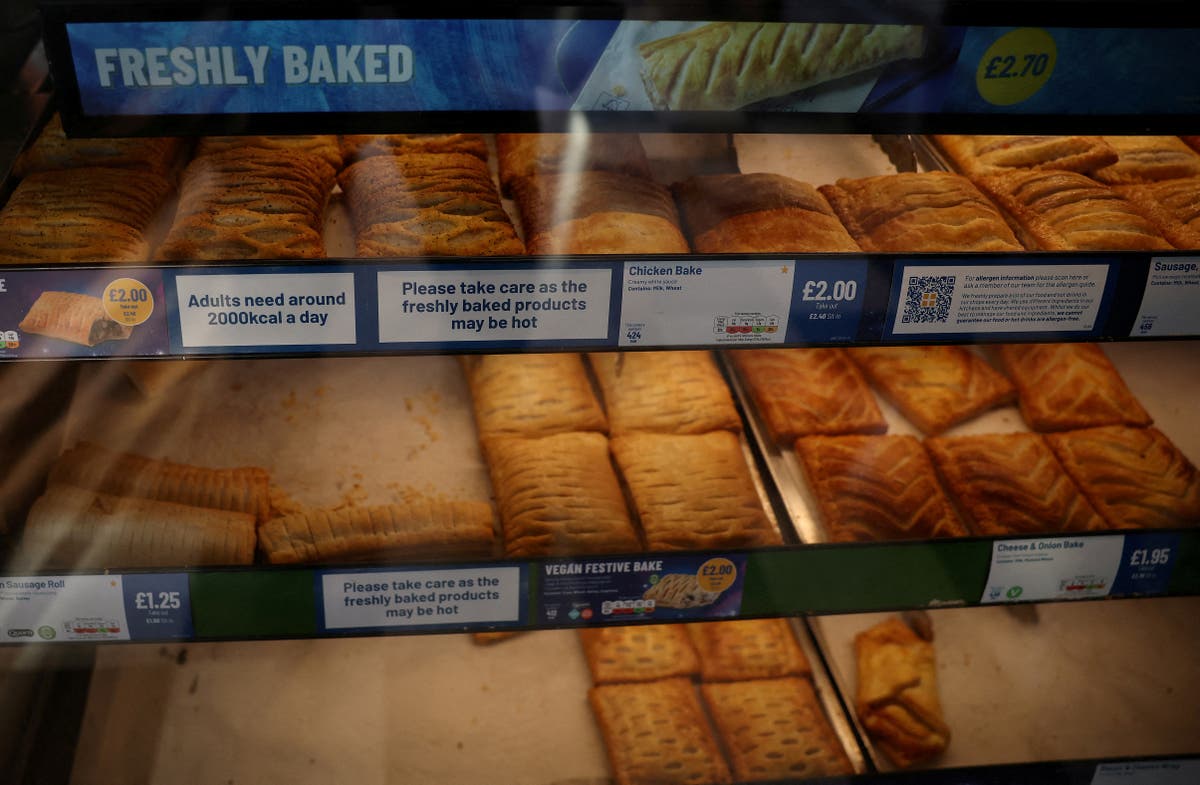
Greggs have recalled one of its most popular items from shelves after a packaging error.
The popular high street bakery chain has warned that some of its packs of steak bakes contain sausage, bean and cheese melts, which were incorrectly labelled as Steak Bakes. This means that some sulphites are not declared on the label.
The UK’s Food Standards Agency (FSA) said: “the product is a possible health risk for anyone with a sensitivity to sulphur dioxide and/or sulphites”
This recall specifically applies to packs of two frozen steak bakes which are sold exclusively at the supermarket chain Iceland, with the best before date of 15 May 2025. No other products, date codes or batches are believed to have been affected.
Customers who have recently bought the product have been advised not to consume it, but return it to their nearest Iceland store for a full refund instead.
Sulphites can be naturally found in some foods, but are also used in the production of some foods to make them last longer and preserve their colour and flavour. They can trigger stomach issues or problems with airways for people with sensitivities.
Sulphites work as food preservatives by releasing sulphur dioxide. This is an irritant gas which can cause the airway to become irritated and constricted for those who are sensitive to sulphites.
The gas is released when sulphite containing foods interact with stomach acid, which can trigger stomach issues, but the gas can back up into the airway which causes symptoms.
The incidence of sulphite sensitivity in the general population is thought to affect less than two per cent, but this rises between five and 13 per cent in those who suffer from asthma, according to Allergy UK.
Those who have asthma may have mild reactions to sulphites, although there are a small number of reports of serious allergic reactions to sulphites, such as anaphylaxis.
NewsBeat
Starmer vows to curb ‘NIMBY’ legal blocks on infrastructure

Politics reporter
Political reporter
 Getty Images
Getty ImagesMajor infrastructure projects like nuclear plants, train lines and wind farms will be built faster under new planning rules, the government has pledged.
Prime Minster Sir Keir Starmer said Nimby (Not in My Back Yard) “blockers” of major infrastructure projects will have fewer chances “to frustrate growth” through repeated legal challenges.
Currently, infrastructure schemes can be challenged in the courts up to three times – ministers intend to reduce that to once in most cases.
Tory shadow levelling up secretary Kevin Hollinrake accused Labour of “taking forward Conservative initiatives” but warned their efforts would fail unless they stopped “blocking our attempts to cut EU legacy red tape”.
Existing rules open up projects approved by elected officials to years of delays and hundreds of millions of pounds of additional costs, the government said.
Opponents of schemes currently have three opportunities to secure permission for a judicial review of a major infrastructure projects in England and Wales: writing to the High Court, attending an oral hearing and appealing to the Court of Appeal.
Under the government’s proposals, the written stage would be scrapped – meaning campaigners will have to convince a judge in person.
Additionally, any challenges deemed “totally without merit” by a High Court judge would be unable to go over their heads to the Court of Appeal.
Scotland has its own legal and Judicial Review system.
Ministers said overhauling the rules, via the upcoming Planning and Infrastructure Bill, would send a strong signal to global firms looking to do business – that the UK is a “great place to invest”.
Sir Keir said it was time to fix “a broken system that has slowed down our progress as a nation”.
“For too long, blockers have had the upper hand in legal challenges – using our court processes to frustrate growth,” he said.
“We’re putting an end to this challenge culture by taking on the Nimbys and a broken system that has slowed down our progress as a nation.”
Labour has placed planning reforms at the heart of its mission to drive economic growth, also promising to deliver 1.5 million new homes in five years.
During the election Sir Keir’s election pledged to back “builders, not blockers” and promised Labour would prioritise infrastructure to boost growth and expand green energy.
The government has promised to make 150 major infrastructure project decisions by the next election.
The latest announcement follows a review by planning lawyer Lord Charles Banner, who recommended streamlining the judicial review process so claimants had “fewer bites of the cherry” when seeking permission to bring a case.
The review found that around a third of applications for judicial review of major projects were refused permission to proceed entirely, although it was not clear how many had been deemed “totally without merit”.
Welcoming the changes Lord Banner said “reducing the number of permission attempts to one for truly hopeless cases should weed out the worst offenders”.
“I look forward to seeing these changes help to deliver a step change in the pace of infrastructure delivery in the months and years ahead.”
According to the government, more than half of decisions on nationally significant infrastructure projects are taken to court – causing an average delay of 18 months and adding millions to costs.
Officials pointed to cases including the approval of Sizewell C in Suffolk, where campaigners spent 16 months seeking permission for a judicial review despite their case being described as “unarguable” at every stage.
However, only some of the grounds in the Sizewell C case were deemed “totally without merit”, meaning the remaining grounds could still have been reconsidered by the Court of Appeal.
In response to the government’s proposals Hollinrake said: “While we welcome the government taking forward Conservative initiatives to streamline the planning system, Labour’s blocking of our efforts to cut EU legacy red tape, such as nutrient neutrality, so they can align more closely with the European Union will hold Britain back.”
NewsBeat
‘I got a credit card after losing the winter fuel payment’

Cost of living correspondent & producer
 BBC
BBCSandra said she used to depend on her winter fuel payment, but when it became means tested her pension pushed her £20 a week over the threshold so she lost it.
“I’ve had to take out a credit card, overdraft and a credit account to be able to pay for things this winter,” she told the BBC.
Sandra is one of the 11 million pensioners who lost the payments, worth up to £300, just as temperatures dropped.
The government said it was committed to supporting pensioners but charity Age UK said it had seen a 60% increase in calls to its advice line during the worst of the cold snap.
“I have £4 in my [bank] account currently,” said Sandra, 66, who lives alone in County Durham. “I’m paying off my credit [card] account month by month, something that is a direct result of losing the winter fuel allowance.
“Psychologically, it makes you feel a bit of a failure.
“We’re still in the middle of winter, so I’m just hoping and praying we don’t get another cold snap because I don’t have anywhere to go if I can’t pay my bills.”
The winter fuel payment is a lump sum of £200 a year for pensioners under 80, increasing to £300 for over 80s. It is paid in November or December and used go to all pensioners regardless of their income.
Last year the government announced it would be restricted to those who qualify for pension credit and other means-tested benefits.
Age UK said the number of calls to its Advice Line increased by 50% in the first full week of January, rising to 60% the week after.
A spokesperson said: “The cold weather is one of the biggest topics callers are worried about at the moment.
“Even though the date to claim pension credit by, to be awarded the winter fuel payment this year has now passed, we are still seeing enquiries for benefit checks due to the increased worry of meeting the cost of living.”
‘A lot of money to lose’
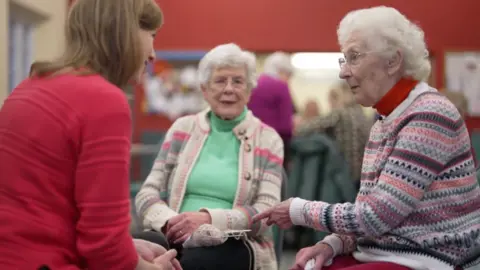
Earlier this month, temperatures dropped so low in the small village of Sedbergh in Cumbria that cold weather payments were triggered.
The one-off £25 sum is paid to those on benefits during prolonged cold weather.
Next door neighbours Rosemary, 93, and Marjorie, 92, have known each other since primary school. Neither of them qualified for winter fuel allowance or cold weather payments this year.
“It’s a lot of money to lose,” Rosemary said. “It makes a big difference. You shouldn’t rely on it but you did rely on it, I though ‘oh well I can get a bit of extra food I can get another bag of coal in’.”
Marjorie’s home is old and poorly insulated. “I find it difficult to heat my home because I’ve got all outside walls and they’re stone,” she said.
Data from the Department for Levelling Up shows that the area to the north of Sedberg is the worst in England for energy efficient homes.
17.7% of homes in and around Penrith have the lowest EPC ratings – F or G.
‘They’re not turning the heating on’

At the Grange Community Centre in Blackpool, Rachel Denby advises pensioners on how to make their homes more energy efficient and keep their bills down.
“An elderly person might pay all the bills, stay on top of payments and not be in any debt so from the outside it doesn’t look like there’s an issue, but in reality they’re not eating or they’re not turning the heating on,” she told the BBC.
The government said it did not want to see anyone suffer this winter and was committed to supporting pensioners with millions set to see their state pension rise in April.
Politics
Donald Trump scrapping TikTok ban is a ‘sign he listens to young people’ -‘He just did a huge thing for Gen Z!’

Commentator Brett Cooper has praised Donald Trump’s decision to save TikTok, calling it a “huge thing for Gen Z” that demonstrates his willingness to listen to young voters.
Speaking to GBN America, Cooper said the move was “culturally the right thing to do” despite some conservatives wanting the platform banned.
She explained: “I think culturally it was the right thing to do. I think you can get into the nitty gritty of the politics.
“I know that he has some plans, possibly to get them to divest, which would probably be better for our country.

Commentator Brett Cooper praised Donald Trump for his decision
GB News
“I think culturally he just did a huge thing for Gen Z. I know that there are a lot of Conservatives that are saying we need to ban and get rid of it.
“I think this was a huge signal from Trump to young people saying, I’m listening to you. I’m listening to what you value and what’s important to you.
LATEST DEVELOPMENTS
“I know that this, is many of your livelihoods, and I’m going to do something to fix this. And for a lot of people, what I’m seeing online, these young people are saying I didn’t realise that this is the kind of guy he was.
“Maybe he can actually do something. “
Donald Trump suspended the TikTok ban in the United States on his first day as president, marking a dramatic shift in the platform’s fate.
The decision came after TikTok briefly went offline for its 170 million US users over the weekend.
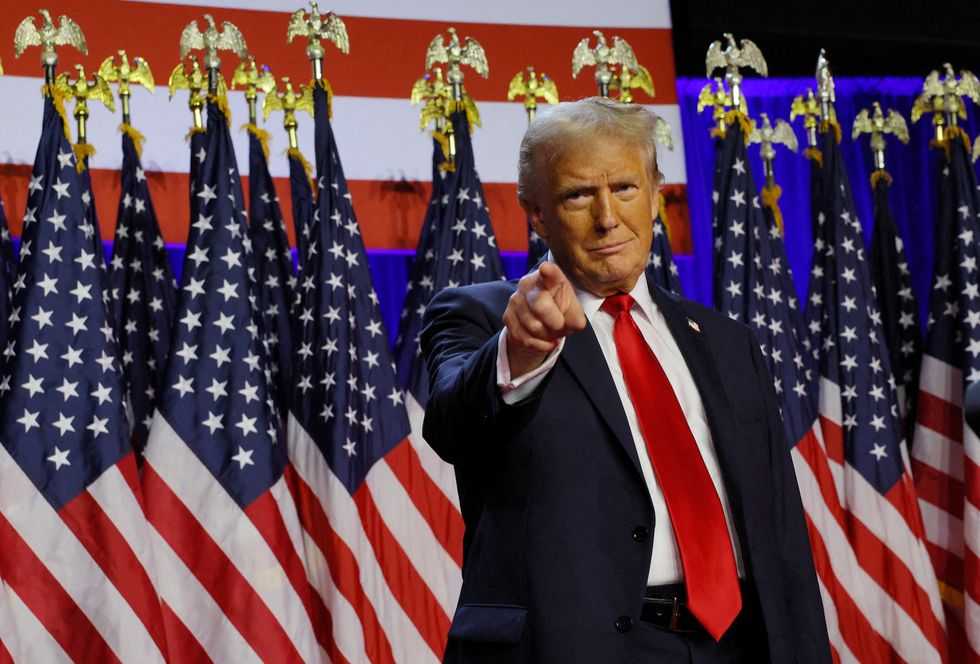
Donald Trump signed the executive order on his first day in office
Reuters
Trump signed the executive order on January 20, his first day in the White House, reversing course on legislation signed by former president Joe Biden in April.
He announced his intentions on Sunday through his Truth Social platform, declaring “Save TikTok” in capital letters.
The video-sharing platform was pulled from US app stores on Saturday after the Supreme Court upheld new rules requiring ByteDance to sell TikTok or face a ban.
Users attempting to access the app were met with a notice stating: “A law banning TikTok has been enacted in the U.S. Unfortunately that means you can’t use TikTok for now.”

Brett said that is it a ‘signal he listens to young people’
GBNA
The shutdown caught many off guard, as tech experts had suggested those with the app already installed could continue using it until it became obsolete without updates.
Chew released a video praising Trump for taking a “strong stand for the First Amendment and against arbitrary censorship”.
“We are grateful and pleased to have the support of a president who truly understands our platform”, said Chew, noting Trump’s own success on TikTok with “60 billion views of his content”.
Despite the temporary shutdown, the app remains installed on existing users’ devices, though future iOS updates may affect functionality.
NewsBeat
Ex-UK counter terrorism chief brands government plan to extend terrorism definition a ‘mistake’
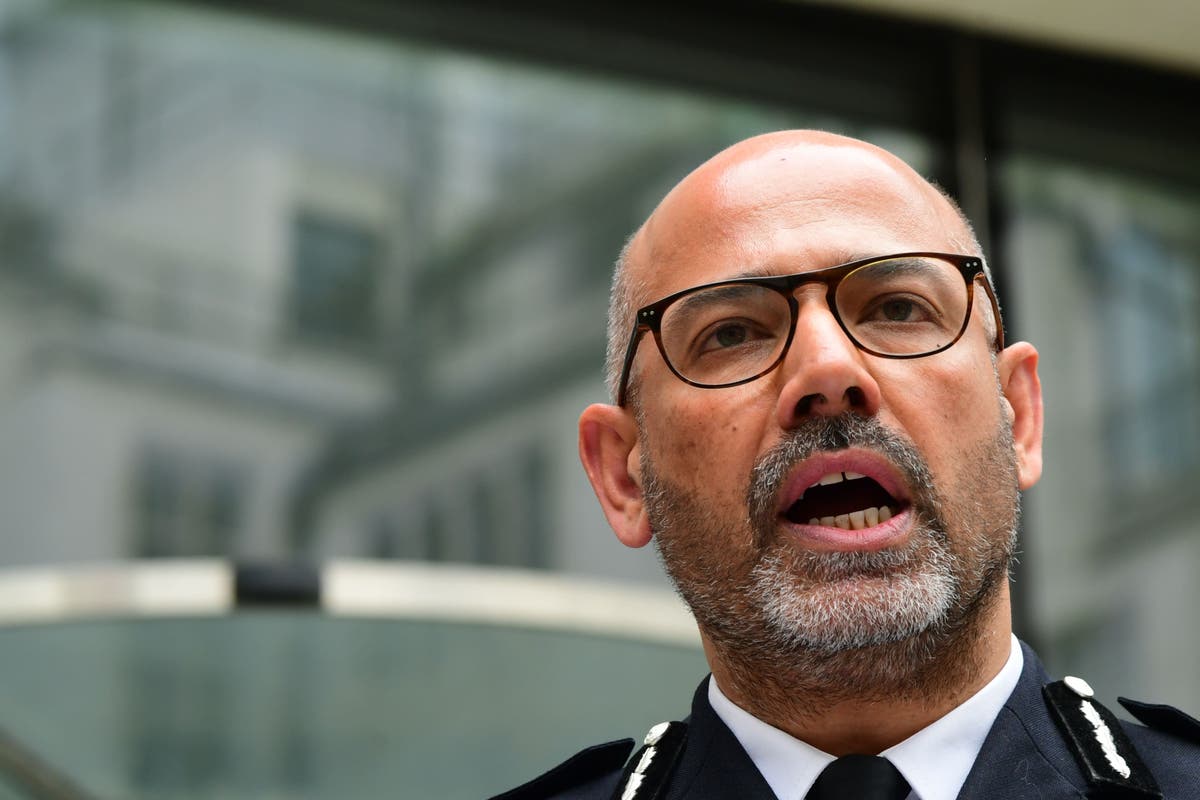
The former head of counter-terrorism policing in the UK has branded the government’s proposal to extend the definition of terrorism to encompass atrocities carried out by lone attackers like the Southport killer “a mistake”.
Former Metropolitan Police assistant commissioner Neil Basu warned violent individuals could “revel” in being called terrorists as he also warned against the use of the term “lone wolf” due to the risk of “glorifying” perpetrators.
Sir Keir Starmer announced a review of terror laws to address “extreme violence carried out by loners, misfits, young men in their bedrooms” after Axel Rudakubana, 18, pleaded guilty on Monday to murdering three girls at a Taylor Swift-themed dance class in Southport, Merseyside, in July.
The attacks sparked widespread riots across the UK last summer, fuelled by online misinformation that Rudakubana was an asylum seeker who had arrived in the UK on a small boat.

Crime journalists have criticised “significant overreach” by the Crown Prosecution Service after police forces involved in the Southport case said they had been advised against sharing more details.
The teenager pleaded guilty to possessing a knife on the date of the attack, production of a biological toxin, ricin, on or before July 29, and possession of information likely to be useful to a person committing or preparing to commit an act of terrorism.
After Sir Keir claimed in a Downing Street statement that this was evidence of a “new threat” – a different kind of terrorism – but experts have pushed back.
Mr Basu, who also served as Met assistant commissioner of specialist operations, told BBC Radio 4’s Today programme on Wednesday: “Bad legislation is made in haste in response to shocking incidents, and my view about whether we should be extending the terrorist definition – we need to think very carefully about the unintended consequences, my opinion is it would be a mistake.”

Describing the incident as “one of the most shocking and horrific things any of us have ever seen”, he backed the public inquiry announced by the government but stopped short at a review of terror laws, even though he said an expansion was something he had previously pushed for.
Mr Basu said: “We were looking then, and this was in 2019/2020. We’d already seen a growth of what we were seeing as people with no ideologies, so they’re not terrorists, they’re violent individuals.
“And we’ve always had violent people doing violent things, but they’re using any ideology as an excuse for their violent actions. And we were seeing an increase in that number and they were getting younger – and it would’ve been easier to charge them under counter-terrorism [laws].
“When we asked for it then, I don’t think we were thinking about the consequences of what that might be.”
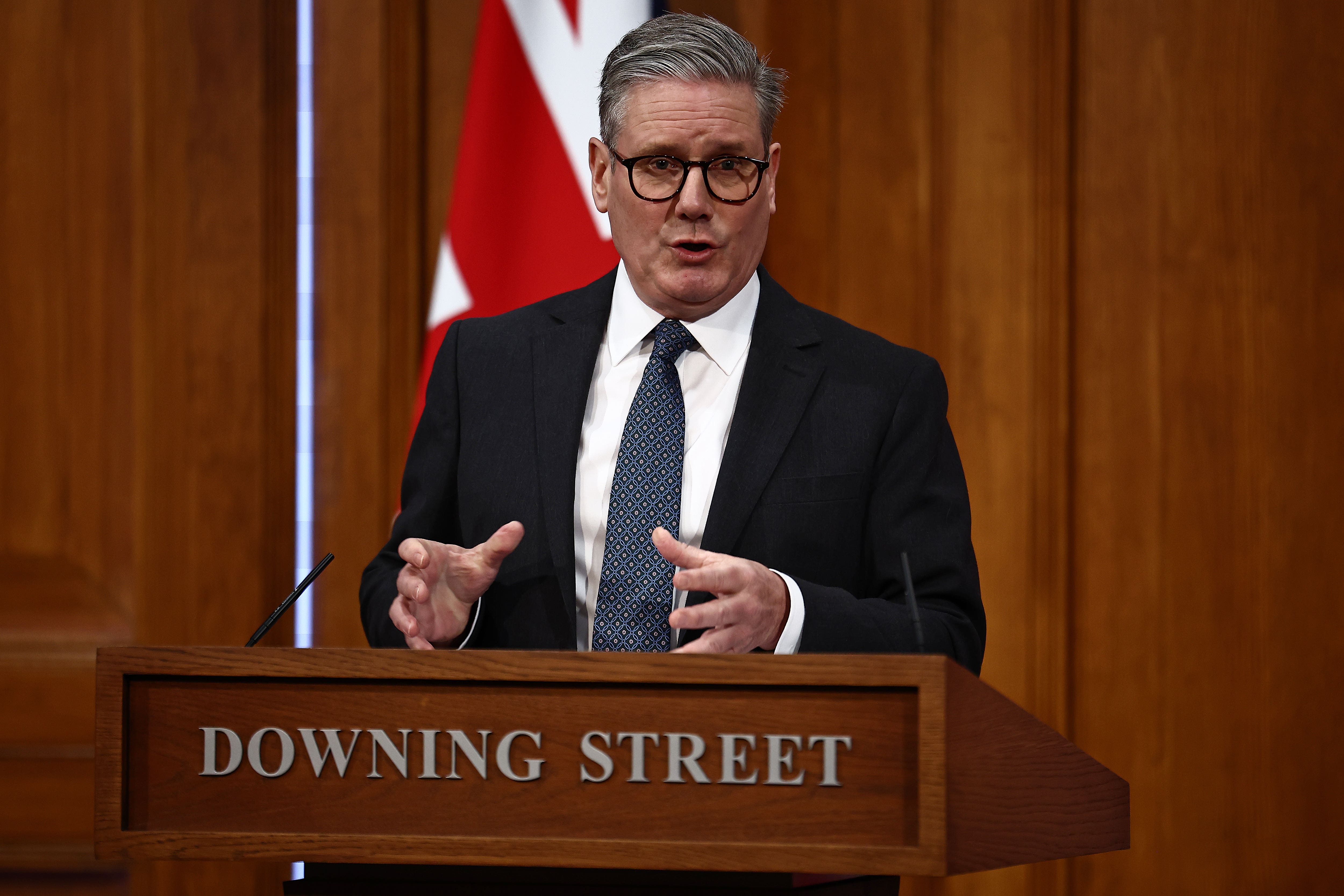
When asked to explain why he changed his mind on the issue, he said: “One of the main things is, these are violent people often with violent or sociopathic or psychopathic thoughts – if we are going to include a definition of terrorism to include them, some of these people are going to revel in that.
“It took us a long time to ask the media not to use the expression lone wolves, because lone-actor terrorists/self-initiating terrorists, as we tried to change the language, really love that – it glorifies them, and that’s what a lot of them are looking for.”
Mr Basu also called for an urgent increase in resources for counter-terrorism or feared lone attackers like Rudakubana will continue to slip through the net.
The public inquiry into Rudakubana was announced on Monday after it emerged the killer had “contact with a range of different state agencies throughout his teenage years”, according to the home secretary, including three referrals to government anti-extremism scheme Prevent due to concerns about his obsession with violence.
Mr Basu described these agencies as “unfunded, untrained, [and] largely staffed by frontline staff who are overwhelmed by demand”, warning: “This will come with a big bill, but that bill has got to be paid if we want to be safe.”
Writing in The Sun, Sir Keir said: “Whatever shortcomings are holding back Britain’s ability to protect its citizens and its children, I will find them I will root them out. No matter who it upsets, I will act.
“Southport must become a line in the sand for Britain.
“There are deep wounds in our society politics now has a responsibility to heal. But that starts by holding up the mirror and facing what we see.”
NewsBeat
China sees resurgence in psychiatric care for ‘trouble-makers’
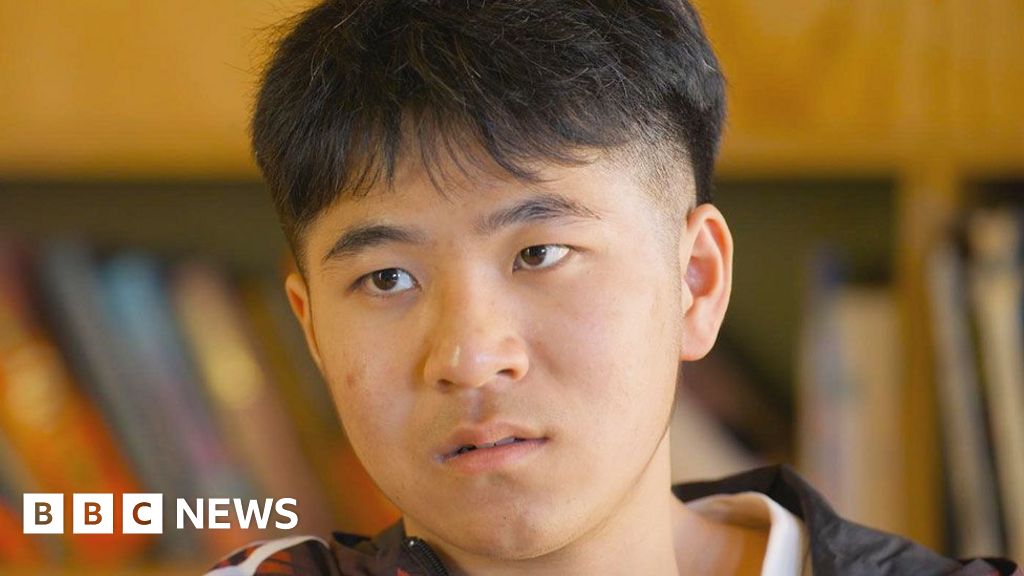
BBC Eye Investigations
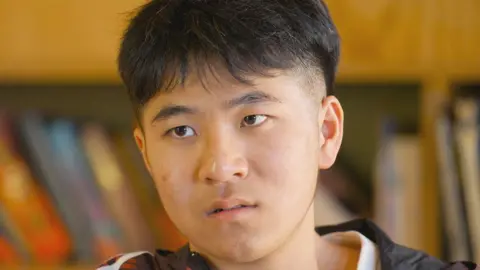 BBC
BBCWhen Zhang Junjie was 17 he decided to protest outside his university about rules made by China’s government. Within days he had been admitted to a psychiatric hospital and treated for schizophrenia.
Junjie is one of dozens of people identified by the BBC who were hospitalised after protesting or complaining to the authorities.
Many people we spoke to were given anti-psychotic drugs, and in some cases electroconvulsive therapy (ECT), without their consent.
There have been reports for decades that hospitalisation was being used in China as a way of detaining dissenting citizens without involving the courts. However, the BBC has found that an issue which legislation sought to resolve, has recently made a comeback.
Junjie says he was restrained and beaten by hospital staff before being forced to take medication.
His ordeal began in 2022, after he protested against China’s harsh lockdown policies. He says his professors spotted him after just five minutes and contacted his father, who took him back to the family home. He says his father called the police, and the next day – on his 18th birthday – two men drove him to what they claimed was a Covid test centre, but was actually a hospital.
“The doctors told me I had a very serious mental disease… Then they tied me to a bed. The nurses and doctors repeatedly told me, because of my views on the party and the government, then I must be mentally ill. It was terrifying,” he told the BBC World Service. He was there for 12 days.
Junjie believes his father felt forced to hand him over to the authorities because he worked for the local government.
Just over a month after being discharged, Junjie was once again arrested. Defying a fireworks ban at Chinese New Year (a measure brought in to fight air pollution) he had made a video of himself setting them off. Someone uploaded it online and police managed to link it to Junjie.
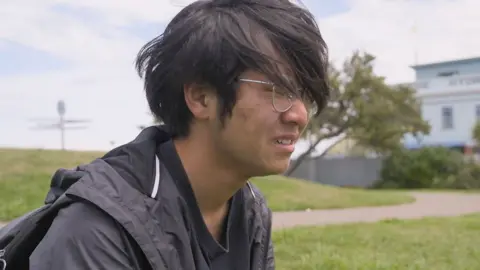
He was accused of “picking quarrels and troublemaking” – a charge frequently used to silence criticism of the Chinese government. Junjie says he was forcibly hospitalised again for more than two months.
After being discharged, Junjie was prescribed anti-psychotic drugs. We have seen the prescription – it was for Aripiprazole, used to treat schizophrenia and bipolar disorder.
“Taking the medicine made me feel like my brain was quite a mess,” he says, adding that police would come to his house to check he had taken it.
Fearing a third hospitalisation, Junjie decided to leave China. He told his parents he was returning to university to pack up his room – but, in fact, he fled to New Zealand.
He didn’t say goodbye to family or friends.
Junjie is one of 59 people who the BBC has confirmed – either by speaking to them or their relatives, or by going through court documents – have been hospitalised on mental health grounds after protesting or challenging the authorities.
The issue has been acknowledged by China’s government – the country’s 2013 Mental Health Law aimed to stop this abuse, making it illegal to treat someone who is not mentally unwell. It also explicitly states psychiatric admission must be voluntary unless the patient is a danger to themselves or others.
In fact, the number of people detained in mental health hospitals against their will has recently surged, a leading Chinese lawyer told the BBC World Service. Huang Xuetao, who was involved in drafting the law, blames a weakening of civil society and a lack of checks and balances.
“I have come across lots of cases like this. The police want power while avoiding responsibility,” he says. “Anyone who knows the shortcomings of this system can abuse it.”
An activist called Jie Lijian told us he had been treated for mental illness without his consent in 2018.
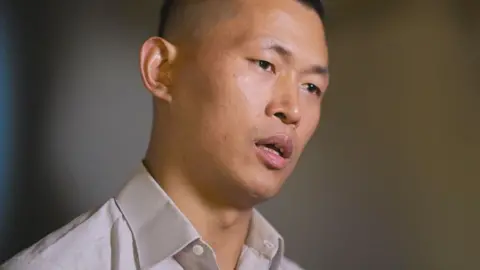
Lijian says he was arrested for attending a protest demanding better pay at a factory. He says police interrogated him for three days before taking him to a psychiatric hospital.
Like Junjie, Lijian says he was prescribed anti-psychotic drugs that impaired his critical thinking.
After a week in the hospital, he says he refused any more medication. After fighting with staff, and being told he was causing trouble, Lijian was sent for ECT – a therapy which involves passing electric currents through a patient’s brain.
“The pain was from head to toe. My whole body felt like it wasn’t my own. It was really painful. Electric shock on. Then off. Electric shock on. Then off. I fainted several times. I felt like I was dying,” he says.
He says he was discharged after 52 days. He now has a part-time job in Los Angeles and is seeking asylum in the US.
In 2019, the year after Lijian says he was hospitalised, the Chinese Medical Doctor Association updated its ECT guidelines, stating it should only ever be administered with consent, and under general anaesthetic.
We wanted to find out more about the doctors’ involvement in such cases.
Speaking to foreign media such as the BBC without permission could get them into trouble, so our only option was to go undercover.
We booked phone consultations with doctors working at four hospitals which, according to our evidence, are involved with forced hospitalisations.
We used an invented story about a relative who had been hospitalised for posting anti-government comments online, and asked five doctors if they had ever come across cases of patients being sent in by police.
Four confirmed they had.
“The psychiatric department has a type of admission called ‘troublemakers’,” one doctor told us.
Another doctor, from the hospital where Junjie was held, appears to confirm his story that police continued surveillance of patients once discharged.
“The police will check up on you at home to make sure you take your medicine. If you don’t take it you might break the law again,” they said.
We approached the hospital in question for comment but it did not respond.
We have been given access to the medical records of democracy activist Song Zaimin, hospitalised for a fifth time last year, which makes it clear how closely political views appear to be tied to a psychiatric diagnosis.
“Today, he was… talking a lot, speaking incoherently, and criticising the Communist Party. Therefore, he was sent to our hospital for inpatient treatment by the police, doctors, and his local residents’ committee. This was an involuntary hospitalisation,” it says.
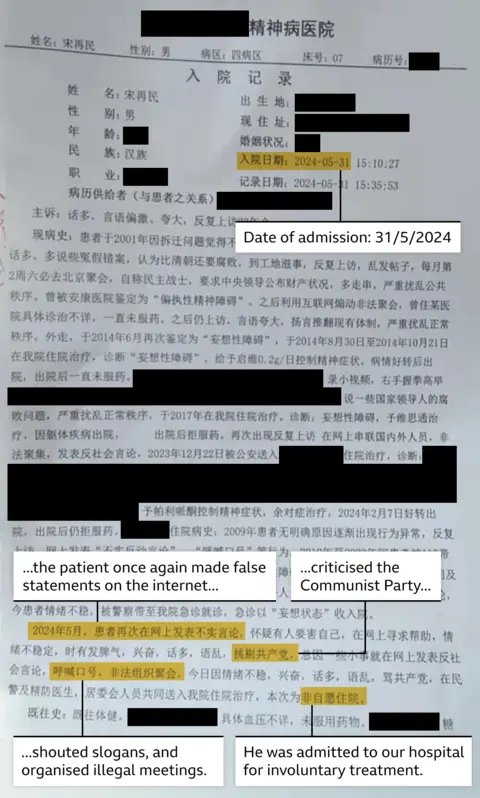
We asked Professor Thomas G Schulze, president-elect of the World Psychiatric Association, to review these notes. He replied:
“For what is described here, no-one should be involuntarily admitted and treated against his will. It reeks of political abuse.”
Between 2013 and 2017, more than 200 people reported they had been wrongfully hospitalised by the authorities, according to a group of citizen journalists in China who documented abuses of the Mental Health Law.
Their reporting ended in 2017, because the group’s founder was arrested and subsequently jailed.
For victims seeking justice, the legal system appears stacked against them.
A man we are calling Mr Li, who was hospitalised in 2023 after protesting against the local police, tried to take legal action against the authorities for his incarceration.
Unlike Junjie, doctors told Mr Li he wasn’t ill but then the police arranged an external psychiatrist to assess him, who diagnosed him with bipolar disorder, and he was held for 45 days.
Once released, he decided to challenge the diagnosis.
“If I don’t sue the police it’s like I accept being mentally ill. This will have a big impact on my future and my freedom because police can use it as a reason to lock me up any time,” he says.
In China, the records of anyone ever diagnosed with a serious mental health disorder could be shared with the police, and even local residents’ committees.
But Mr Li was not successful – the courts rejected his appeal.
“We hear our leaders talking about the rule of law,” he told us. “We never dreamed one day we could be locked up in a mental hospital.”
The BBC has found 112 people listed on the official website for Chinese court decisions who, between 2013 and 2024, attempted to take legal action against police, local governments or hospitals for such treatment.
Some 40% of these plaintiffs had been involved in complaints about the authorities. Only two won their cases.
And the site appears to be censored – five other cases we have investigated are missing from the database.
The issue is that the police enjoy “considerable discretion” in dealing with “troublemakers,” according to Nicola MacBean from The Rights Practice, a human rights organisation in London.
“Sending someone to a psychiatric hospital, bypassing procedures, is too easy and too useful a tool for the local authorities.”
 Chinese social media
Chinese social mediaEyes are now on the fate of vlogger Li Yixue, who accused a police officer of sexual assault. Yixue is said to have recently been hospitalised for a second time after her social media posts talking about the experience went viral. It is reported she is now under surveillance at a hotel.
We put the findings of our investigation to the UK’s Chinese embassy. It said last year the Chinese Communist Party “reaffirmed” that it must “improve the mechanisms” around the law, which it says “explicitly prohibits unlawful detention and other methods of illegally depriving or restricting citizens’ personal freedom”.
Additional reporting by Georgina Lam and Betty Knight
Politics
‘The right thing to do!’ Brett Cooper praises Trump’s choice to save TikTok


Commentator Brett Cooper has praised Donald Trump’s decision to save TikTok, calling it a “huge thing for Gen Z” that demonstrates his willingness to listen to young voters.
Speaking to GBN America, Cooper said the move was “culturally the right thing to do” despite some conservatives wanting the platform banned.
-

 Fashion8 years ago
Fashion8 years agoThese ’90s fashion trends are making a comeback in 2025
-

 Entertainment8 years ago
Entertainment8 years agoThe Season 9 ‘ Game of Thrones’ is here.
-

 Fashion8 years ago
Fashion8 years ago9 spring/summer 2025 fashion trends to know for next season
-

 Entertainment8 years ago
Entertainment8 years agoThe old and New Edition cast comes together to perform You’re Not My Kind of Girl.
-

 Sports8 years ago
Sports8 years agoEthical Hacker: “I’ll Show You Why Google Has Just Shut Down Their Quantum Chip”
-
Business8 years ago
Uber and Lyft are finally available in all of New York State
-
Entertainment8 years ago
Disney’s live-action Aladdin finally finds its stars
-
Sports8 years ago
Steph Curry finally got the contract he deserves from the Warriors
-
Entertainment8 years ago
Mod turns ‘Counter-Strike’ into a ‘Tekken’ clone with fighting chickens
-
Fashion8 years ago
Your comprehensive guide to this fall’s biggest trends







You must be logged in to post a comment Login